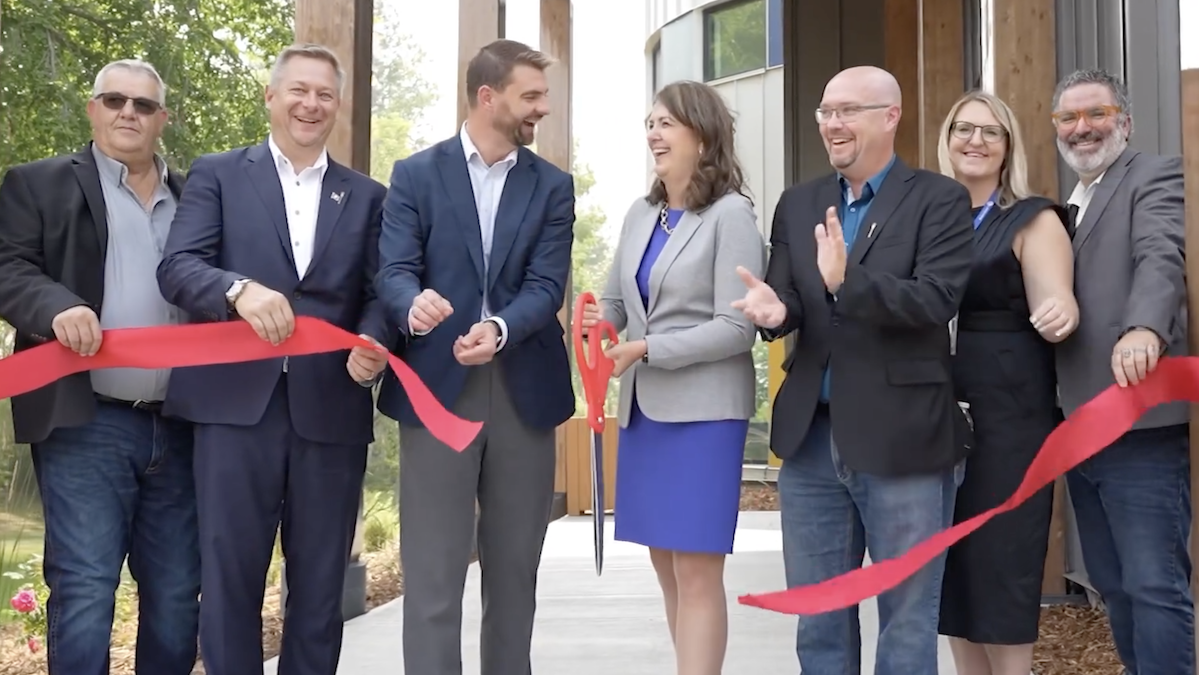“Alberta opens its third world-class recovery community,” said the headline on a news release sent by the Alberta Government to media about a reopened rural addiction treatment facility off the beaten path west of Edmonton.
After being subjected to some gentle mockery on social media, the headline on the government website soon read: “Alberta opens another world-class recovery community” – its third, presumably.
Regardless of the unintentionally amusing headline, the “Lakeview Recovery Community” in the village of Gunn across Lac Ste. Anne from Alberta Beach is clearly intended to be a showpiece for the United Conservative Party (UCP)’s controversial “Alberta Recovery Model” of drug addiction treatment.
Despite grave concerns by many addiction treatment professionals and experts, the UCP “recovery model” is the only model accepted by the Smith Government – a matter of both ideology and practical politics, since “recovery communities” lend themselves to privatized operation and nobody wants to have to face the human evidence of the drug addiction crisis plaguing every jurisdiction in North America.
As a result, harm reduction approaches to drug dependency have been declared ideologically and politically verboten by the UCP as it lavishes many millions of dollars on 11 new recovery camps like the Lakeview Recovery Community, the huge Recovery Alberta agency now being spun off from Alberta Health Services (AHS), and the so-called Canadian Centre of Recovery Excellence, the addictions war room established to produce research that justifies the government’s one-track approach to addiction treatment.
Whether the Gunn facility, upgraded at a cost to taxpayers of $21 million on the site of a ramshackle dry-out centre for homeless people that was closed by the government in 2021, turns out to be a glowing success or a Potemkin village will likely to be difficult to tell – it’s not as if the UCP is going to admit it if it turns out to be a bust.
Still, some of the claims in yesterday’s rambling news release are difficult to believe, for example, the implication that many clients can be returned to their communities ready to resume productive lives after three months in a recovery camp.
“At each of the recovery communities built by Alberta’s government, clients participate in a program that averages around three months long,” the news release says. “If necessary for their success in recovery, a client could stay for up to one year.”
“With 75 designated treatment beds on site, the Lakeview Recovery Community is expected to support up to 300 people every year in their pursuit of recovery,” the statement said. The facility opened to clients on July 29.
According to the release, the Lakeview site will be operated by ROSC Solutions Group Inc., a private company established in 2022 that has offices in Calgary.
It will also be home to something called the Recovery Training Institute of Alberta, a government financed centre for training addiction treatment workers according to the precepts of the UCP’s favoured recovery model.
“Alberta’s government is creating a workforce of people who are well-educated and trained in the sector,” says the release, which may come as a surprise to the drug treatment professionals employed by AHS, which Premier Smith and Addiction Minister Dan Williams seem determined to keep as far as possible away from influencing how Alberta responds to the addiction crisis.
The Chief Executive Officer of ROSC Solutions is Carson McPherson, former CEO of Cedars Cobble Hill, a 75-bed abstinence-based residential addiction treatment centre on Vancouver Island.
Dr. McPherson has a degree called a D.SocSci, Doctor of Social Science, granted by Royal Roads University near Victoria, one of only two North American universities that offer the credential.
Dr. McPherson is credited with coining the term “Alberta Recovery Model” in an Edmonton Journal op-ed published in 2020, in which he touted the UCP’s approach – although not without conceding that “supervised consumption sites can and should have a place in a full continuum of care when operated properly and embraced by the community.” That’s enough caveats, presumably, to satisfy the UCP.
According to researcher Euan Thomson, who took a deep dive into ROSC’s business relationship with the Alberta Government on his Drug Data Decoded policy website, Dr. McPherson is a former associate of Marshall Smith, the current chief of staff to Premier Danielle Smith.
Marshall Smith is widely recognized as the chief advocate and virtual spiritual leader of the government’s controversial approach to recovery treatment.
“Cedars had previously employed Marshall Smith as its Director of Corporate Development and Community Relations, fresh off his controversial stint at Baldy Hughes in Prince George,” wrote Dr. Thomson, a PhD microbiologist who is sharply critical of the Alberta Recovery Model. “McPherson and Marshall Smith also worked together at the BC Centre on Substance Use.”
An internal report by the B.C. Government drafted in 2011 suggested the Baldy Hughes drug treatment facility was mismanaged during Mr. Smith’s tenure.
Smith left B.C. to become chief of staff to former UCP associate minister of mental health Jason Luan, who lost his seat in the 2023 election.
Bill Caldwell, identified in yesterday’s news release as the director of the Recovery Training Institute of Alberta, was director of community care and director of strategy and social projects at Cedars Cobble Hill.
Meanwhile, Katy Merrifield, former executive director of communications to UCP premier Jason Kenney and director of communications for B.C.’s last conservative “Liberal” premier, Christy Clark, will soon return to Alberta to run the addictions war room’s communications and engagement side.



